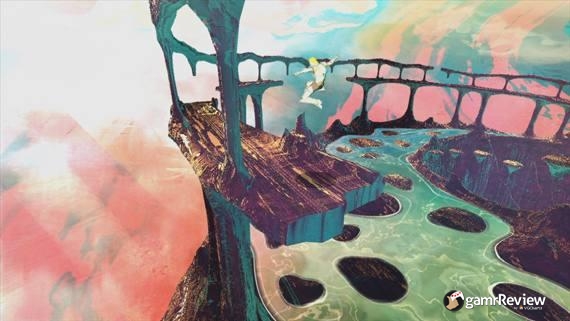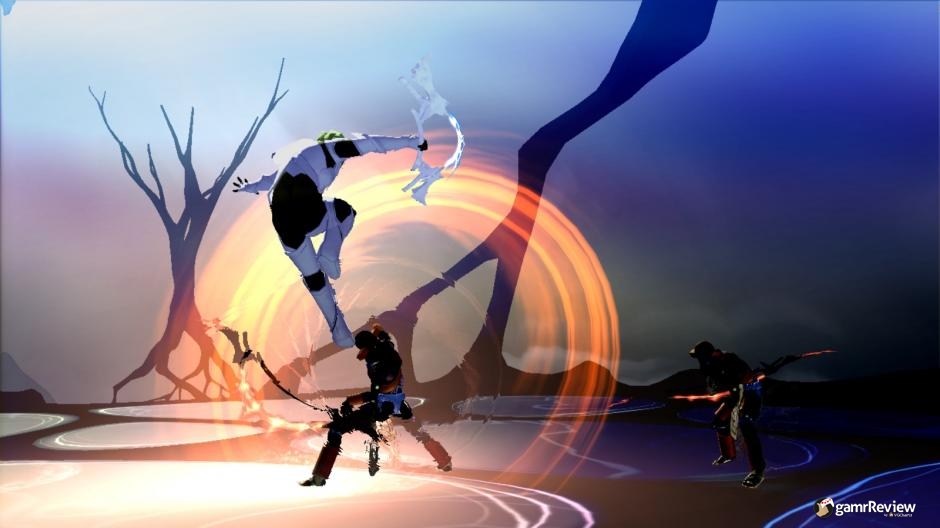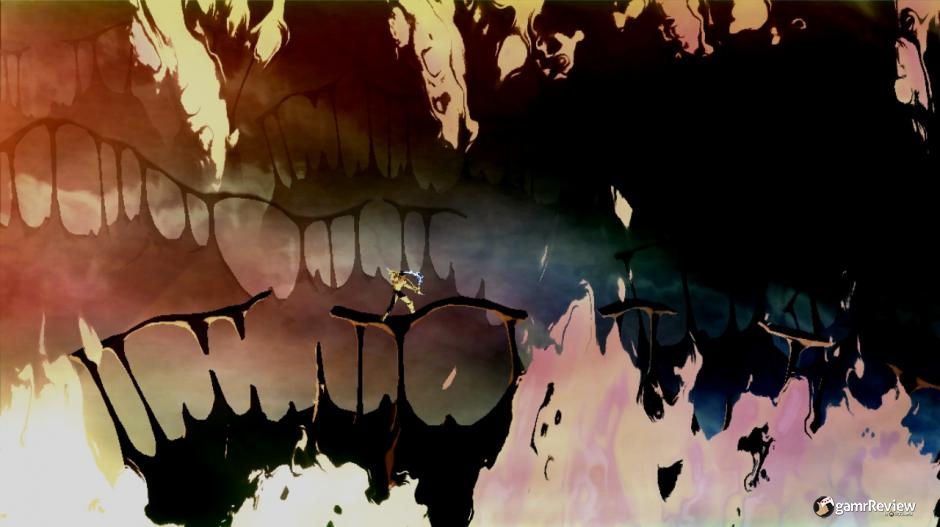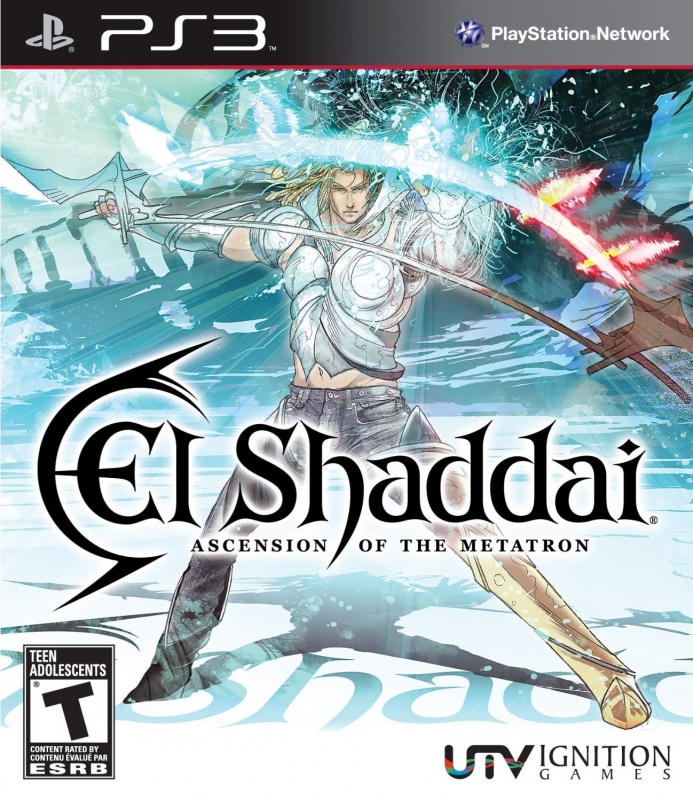
El Shaddai: Ascension of the Metatron - Review
by VGChartz Staff , posted on 09 September 2011 / 6,007 ViewsDue to some prolific film critics, the "are games art?" discussion has fluctuated in the public eye over recent years. While this can be the subject for debate long into the indecisive night, it has had an effect on the game developing community, with titles that focus on a more fluid, overarching experience rather than gameplay innovation. This is by no means an industry trend, but more and more games have been implementing such a philosophy where conventional mechanics, such as the "archaic" game over screen, are being thrown into the wind.
El Shaddai: Ascension of the Metatron follows a similar philosophy, concentrating more on the overall feel of the title. By creating a very stylized, abstract aesthetic and streamlining the action, Ignition firmly plants its foot in the "art" debate's door, for better or for worse.
Stepping into the role of Enoch, a priest from Heaven charged with returning seven fallen angels to prevent a great flood from decimating earth, it's easily observed that a certain uniqueness permeates El Shaddai, from its visuals to its serialized plot. Each chapter feels like a story in itself, with the end of each one bringing both a narration of events to come and a recap of the previous chapter by God's go-to man, Lucifel. Helping Lucifel with his narrator duties are the four, body-less archangels, who offer assistance throughout Enoch's quest, but are essentially unnecessary, as they're plot-related additions that fail to supplement the story and prove to be more confusing than anything. While the plot wins points for originality, its pacing is destroyed by the segmented feel and loses its captivating factor.

Keeping with the unique storytelling, El Shaddai features an exceptional, abstract art style, blending many contrasting colors and shapes to form some truly breathtaking visuals. The simplicity of combat keeps the focus on your surroundings, enabling you to admire and absorb the standout aesthetics as you sit in awe of the gleaming caverns and trees that whisp like clouds. Creativity bleeds through each new area, where vibrant oranges and yellows seep into the blackness behind it, only to radiate in whites and blues. The audio work, an excellent mix of tribal chants and intense electronic beats, fits the superb style perfectly, mesmerizing you with a plethora of joy as you dart around heavenly inspired (and ingrained) backdrops.
El Shaddai's combat, streamlined and easy to jump into, fits well with the game's inclusive style. Three weapons are the driving force behind it: the Arch, the Gale, and the veil, each having its own particular strength or weakness that is akin to "rock-paper-scissors" that both enemies and bosses utilize. The Arch is a fast blade-type weapon, the Gale is ranged and rapid firing, and the Veil doubles as slow, powerful gauntlets and an unbreakable shield. Each must first be stolen and purified from one of your enemies, and as you continue to use your newly-acquired piece of equipment, you'll have to make sure to keep purifying it in order to keep it at peak condition.

With simplicity and fluidity the driving factors behind Enoch's abilities, many warring reactions will surely arise, and it's relatively easy to fall in with one or the other. While combat feels infinitely smooth due to the rhythm-esque movements needed to optimally control each fight, there's much to be desired in terms of variety. Enoch relies on a small handful of well-timed combos, and while the combination of this with the specific offensive capabilities of each weapon provides a ton of fun, it's hard to prevent repetition from setting in. However, given the somewhat short playtime that clocks in at around eight hours or so (although Lucifel claims that it can be done in seven, "if you're good enough"), boredom never really has a chance to set in. For the most part, combat gives a refreshing taste of a decent system that could benefit from slight improvements, and leaves only a sparse repetitive aftertaste.
Enemies, and especially bosses, provide a healthy challenge, which is a great change of pace from many of El Shaddai's button mashing brethren. Since there is no HUD, enemies, and Enoch, visibly take damage, knocking off chunks of armor (see: health) in the process, which further adds to the challenge. Yet it's awfully hard to get a game over. By button mashing (ahem), Enoch can bring himself back from the brink of death a good handful of times, enabling the game's flow to continue uninhibited. It makes sense by both the style and narrative standards, but it diminished the enjoyable difficulty it hopes to achieve, even if gaining the upperhand in battles is undeniably sweet.
While most of your time will be spent running around the third-dimension, many varied, fun 2D sections await your exploration, with each level as beautiful as the rest of the game. Though some enemies will arise, focus is kept on the relatively tame platforming, but there are some neat ideas that work off of the game's outstanding aesthetics; I've always wanted to cloud-surf.

With so much to love, I'd be lying by saying it didn't have any problems. Due to being fixed, El Shaddai's camera makes it a struggle during 3D platforming sections, adding an unnecessary degree of frustration, which especially dampers the flow of the game. Linearity can also be seen as an issue, for you never get to truly stretch your legs amongst the lavish setting, yet a desire for exploration rarely, if at all, rises. The good qualities far outweigh the bad, as the marvelous visuals are enough to warrant a purchase, but El Shaddai: Ascension of the Metatron offers some refreshing gameplay that features some exuberant and often crafty boss encounters, rhythmic styled combat, and fun 2D sections. It's not perfect, but it is definitely fun, and throws open the door on the "are games art?" debate.
VGChartz Verdict
8
Great


























